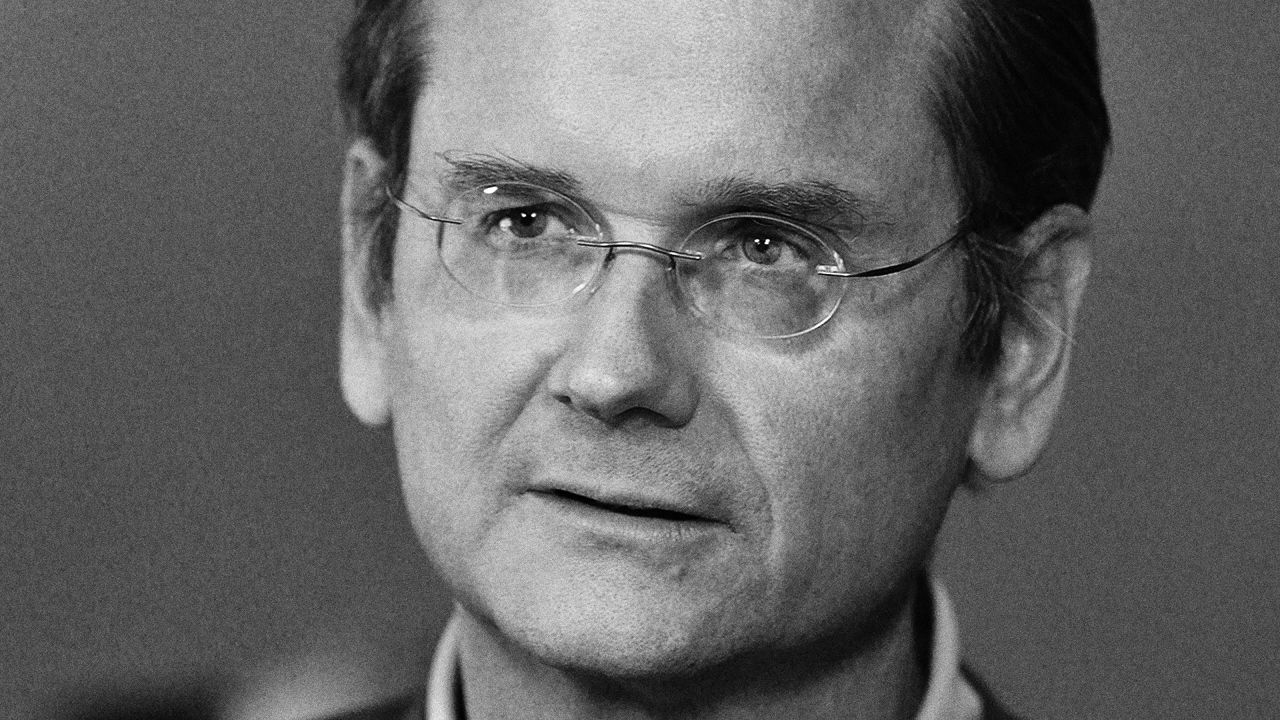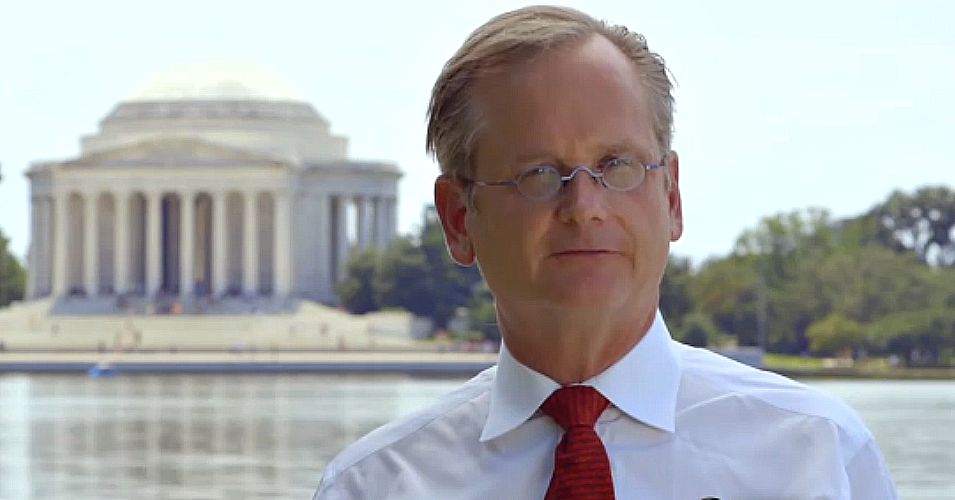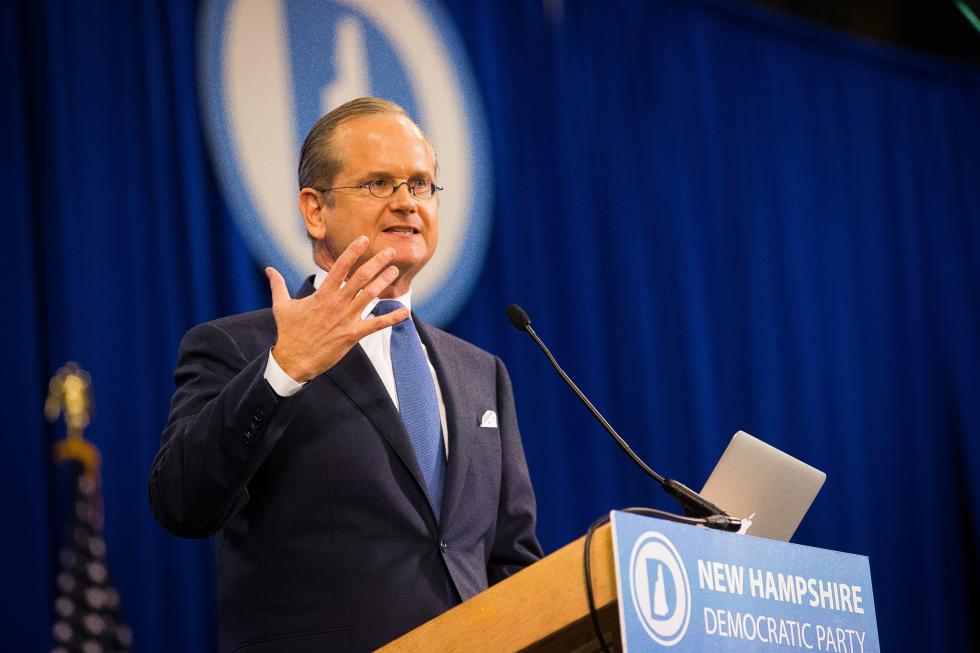Just like Lincoln Chaffee, Jim Webb, George Pataki, and John Kasich, Lawrence Lessig has no chance of actually being elected president. But unfortunately, Chaffee, Webb, Pataki, and Kasich were allowed into debates, while Lessig's been confined to the sidelines.
[Editor's note: On Monday, Lessig announced he was dropping out of the race due to a Democratic Party rule change that precludes him from entering the debates.]
You might know Lawrence Lessig from his decades of activism around reducing copyright abuse, enacting campaign finance reform, and severing the collaboration between politicians and lobbyists. He's all about clean, fair, functioning government, and so naturally he's viewed as public enemy number one by our current dirty, rigged, dysfunctional politicians.
That's because he has a plan to overhaul the system with a series of reforms that would ensure that everyone has equal access to a vote; that everyone is fairly represented; and that no one person has disproportionate control over an election.
For those reasons, the Democratic party is doing everything in its power to prevent you from finding out about him.
Lessig has one big issue: reforming the political gamesmanship that keeps power in the hands of the rich. To that end, he's proposing the Citizen Equality Act, which would expand voting access to underserved populations; reverse district gerrymandering; and reduce big-money buyouts of elections. He's also in favor of action on climate change, net neutrality, Obamacare, living wage, subsidized education, the Dream Act, and legalized pot.
He wants to fix the rigging of districts, with boundaries currently set up so that politicians get to pick their own voters. He wants to undo the system of candidates being chosen by whatever millionaires want to pay for their campaigns. And to top it all off, he wants to make Election Day less of a pain in the fucking neck.
And let's be honest — politics could use a little reforming. Even the vote for president — arguably one of the most important elections we face — is rigged with an insane Electoral College system that disproportionately prioritizes certain voters above others. (It takes three Vermont voters to equal one Texas voter. Why? Because!)
But Lessig has one big problem: the Democrats have excluded him from the debates. He's filed all the necessary paperwork; he's running ads; he's managing a budget for his campaign that's larger than that of some of his Democratic rivals. He hit the 1 percent support mark in at least two polls, which is supposed to be the qualifier for appearing the debates. And yet ... he's nowhere to be seen.
It's not like the Democrats don't know he's there. Debbie Wasserman Schultz, the chair (for now) of the Democratic Party, was supposed to have a call scheduled with him, but she stood him up.
The next Democratic debate is on Nov. 6 in South Carolina. Lessig's been excluded from that one as well. At the rate that joke candidates are dropping out, we'll probably only see Hillary and Bernie up there, leaving voters to assume that they're the only two candidates left in the race. Which is exactly what they want you to think.
*
MEANWHILE, Tom McCarthy reported in The Guardian that Lessig dropped out of the race Monday because "it is now clear the [Democratic] party won't let me be a candidate":
Democratic presidential candidate Larry Lessig has announced that he is dropping out of the race, accusing the Democratic party of having changed the rules for inclusion in the debates in a way that made it impossible for him to get in.
“Last week, we learned that the Democratic party has changed its rules for inclusion in the debate,” Lessig said on Monday in web video announcing the news. “And under the new rule, unless we can time travel, there is no way that I will qualify.
“It is now clear that the party won’t let me be a candidate.”
Lessig, a law professor at Harvard University, centered his candidacy on a call for comprehensive campaign finance reform. None of the legislative priorities of the Democratic party were possible, he contended, unless and until corrupt money was removed from politics.
In announcing his withdrawal, Lessig paid tribute to Aaron Swartz, the 26-year-old Internet activist who killed himself in 2013 after federal authorities charged him with 13 felonies for hacking into a Massachusetts Institute of Technology computer network and downloading more than 4m academic articles from the JStor database.
“It was almost a decade ago that my friend Aaron Swartz convinced me to give up my work on internet policy and to take up the fight to fix the failed institution at the core of our democracy – Congress,” Lessig said in the video.
Lessig wrote after Swartz died that MIT could not claim “neutrality” in his death.
Lessig accused the Democratic party of blocking discussion of his banner issue.
“From the start, it was clear that getting into the Democratic debates was the essential step in this campaign,” he said. “I may be known in tiny corners of the tubes of the internets, but I am not well known to the American public generally. Our only chance to make this issue central to the 2016 presidential election was to be in those debates.”
The Democratic National Committee (DNC) did not immediately respond to a request for comment.
A DNC official close to the process told the Guardian in an interview last month that the decision of what candidates to include in the next Democratic presidential debate, on Nov. 14, would be made by CBS News, the host network.
In his video, Lessig says the party changed the debate inclusion rules. “Until this week, the rule was three polls finding me at 1% in the six weeks prior to the debate. Last week we began to get close. Two polls found me at 1%. One more and I would be in the next debate, under the original rule.
“But under the new rule, the standard is three polls at least six weeks before the debate. That means I would have had to have qualified at the beginning of October, which means that nothing that happens now could matter.
“Under this new rule, I am just shut out.”
Lessig concluded with a tribute to Swartz.
“What he got me to see then, we must find a way to get all of America to see now – that we can’t solve any of the problems that this nation must address until we fix the crippled and corrupted institution of Congress first.”
3 WAYS TO SHOW YOUR SUPPORT
- Log in to post comments














